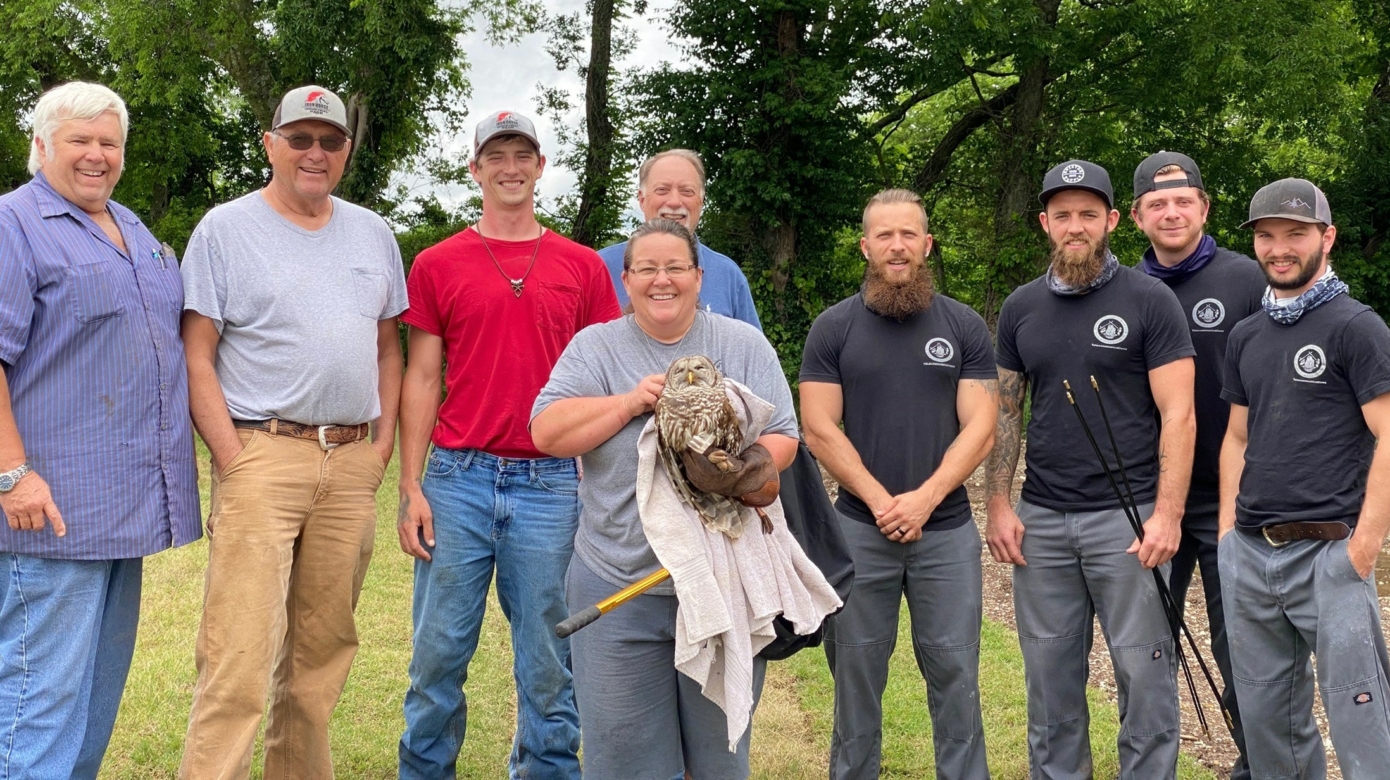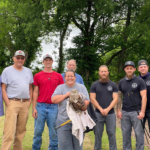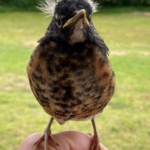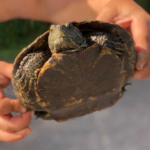The Citizen Potawatomi Nation’s Eagle Aviary honors one of the most sacred animals to the Potawatomi people by providing a home for injured eagles unable to return to their natural habitat. The staff also protects and nurtures other creatures by responding to animal emergencies across CPN’s jurisdiction and partnering with the WildCare Foundation in Noble, Oklahoma.
“We have gotten calls for everything from a skunk to deer to birds. We try to stick with the raptors — the birds of prey — but if we get a call about six baby squirrels, we’re going to try to help,” said CPN Eagle Aviary Manager Jennifer Randell.
Staff fields requests from police departments, animal shelters, community members and more.
“The biggest reason we help the community in this way is to save the animals’ lives,” Randell said. “It’s really rewarding.”
While the aviary hopes to be able to provide raptor therapy and recovery services in-house in the future, it does not have the certifications or training to fulfill that need. Working with WildCare throughout the last decade has filled that gap.
“We love what they do to teach people, and we love absolutely what they do to care for the animals. They just give top-level care for the animals that they have, and we couldn’t ask for anything more than that,” said WildCare staff veterinarian Dr. Kyle Abbot.
Before the aviary officially opened in 2012, word spread quickly about its mission and heart for service. They completed their first rescue in 2010 and now average hundreds of calls per year.
“Not just birds,” Randell said. “That’s everything. It adds up.”
She stressed the aviary would not be able to help as many animals as they have without WildCare.
“They are just phenomenal,” Randell added. “I can’t say enough good things about them — the hours and work they put in and also the emotional toll it takes to do that kind of work.”
Unfortunately, not every story has a happy ending. It’s the instances that do turn out positively that keep the aviary’s staff going. A few years ago, the aviary received a call about an injured red-tailed hawk. The raptor had a brood patch, which indicated it had eggs or was nesting. Randall and fellow aviary staff member Bree Dunham safely transported the hawk from Tecumseh to Nobel where it received the medical attention necessary to heal before releasing the hawk as close to its nest as possible.
“We brought her back right over off of 13th Street and let her go. Within a second, her mate came right to her. It was the most beautiful thing I’ve ever seen,” Randell said.
With a staff of only two, the aviary often relies on the help of others to transport animals to WildCare’s facilities, which does not have the manpower to provide rescue services itself. In the spring of 2021, an owl became entangled in fishing line across Squirrel Creek near Tribal headquarters. Freeing it required the assistance of CPN employees from across the Nation, including mechanical, emergency management, the Cultural Heritage Center, information technology and environmental. After removing the owl from the creek, CHC Visual and Audio Production Manager Shawn Barfield volunteered to deliver it to Noble.
“Anything that cute, you don’t mind helping get it to safety. I know the (aviary) works hard daily caring for wildlife, and I sure didn’t mind helping them out,” Barfield said.
Because of WildCare’s mission and dedication, the CPN Eagle Aviary has found unique ways to support the nonprofit — from volunteering, to delivering supplies and coordinating food donations.
“We get so many different species sometimes, it’s tough to predict exactly our needs, and they have helped us in a pinch before,” Dr. Abbot said. “The Citizen Potawatomi aviary is one of our closest partners for sure.”
How to help
“Animals are always in need of more advocates, more human advocates. There are lots of ways to do it; you just need to be willing to look for it,” Dr. Abbot said.
Every state has rescues, sanctuaries and rehabilitation centers, many of which rely on donations and volunteers to operate.
“Wherever you want to be involved, there are going to be opportunities,” he said. “We encourage people to find those opportunities. A lot of people — like us — have a love and a passion for the wildlife, and I always encourage people to follow that passion.”
If someone comes across injured, ill or abandoned animals, Dr. Abbot and the aviary staff recommend following a few simple guidelines.
Never touch species known to carry rabies barehanded, like skunks and bats in Oklahoma. Using gloves mitigates risks.
“If you touch (a rabies vector species) without gloves on, they will have to put the animal down. It’s the only way to test for rabies,” Randell explained.
Do not offer them food or water.
“If you try to give an injured animal water — especially a bird, but most injured animals — and they aspirate, they’re not going to make it,” she said. “Animals can go a while without food or water and be just fine.”
Upon finding an animal in need, contact a rescue, rehabilitation center or sanctuary, or reach out to local, state or regional authorities. Organizations whose expertise involves wildlife care and recovery often provide the most helpful instructions.
“The sooner you get an animal to those people, the better it is for that animal,” Dr. Abbot said. “We definitely encourage people to get the animals as soon as they can reasonably to us, that way we can begin treatment.”
For information on Oklahoma-based organizations, visit cpn.news/OKlist, and view contact information for centers across the United States at cpn.news/USAlist.
WildCare offers online resources that include best practices for some of the most commonly found animals in Oklahoma. Find the flowcharts at cpn.news/wildemergency.
Learn more about the CPN Eagle Aviary at potawatomiheritage.com.




